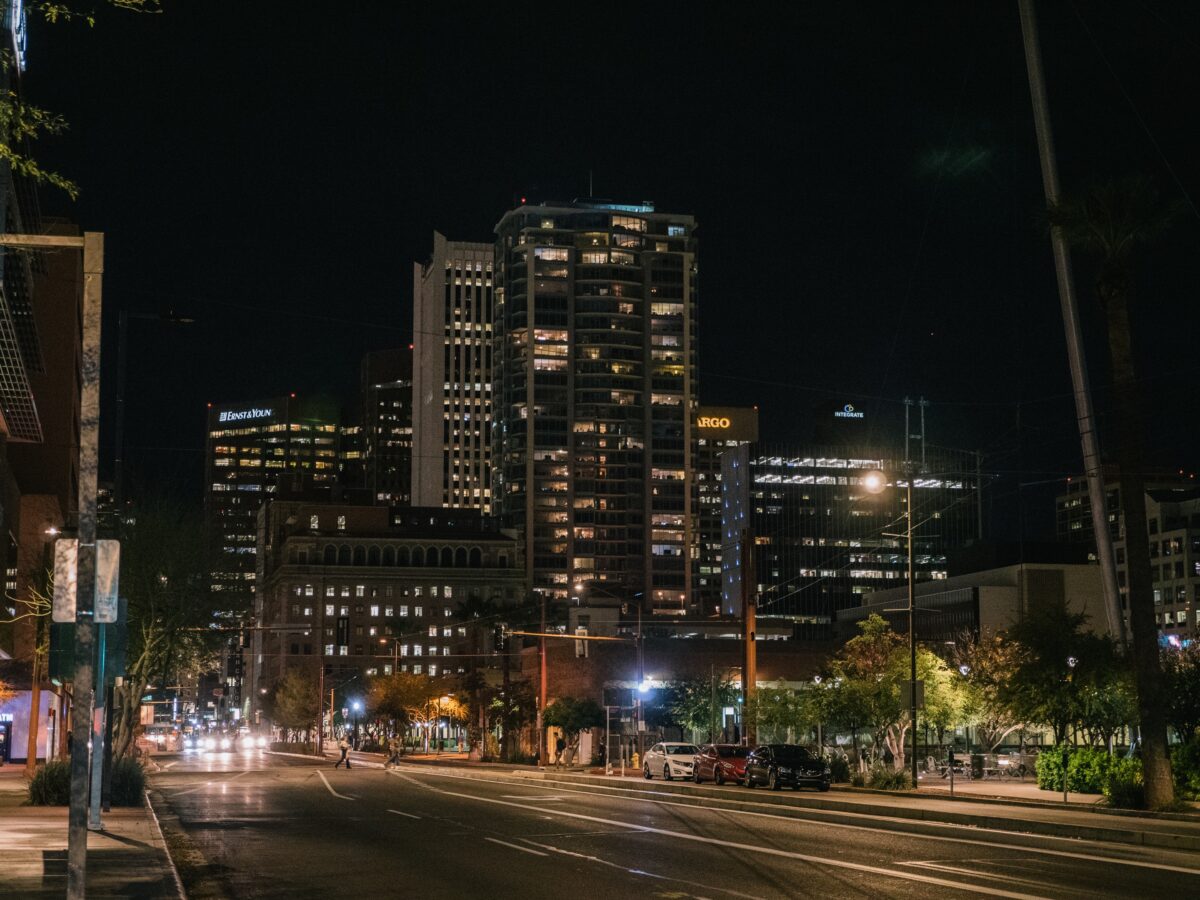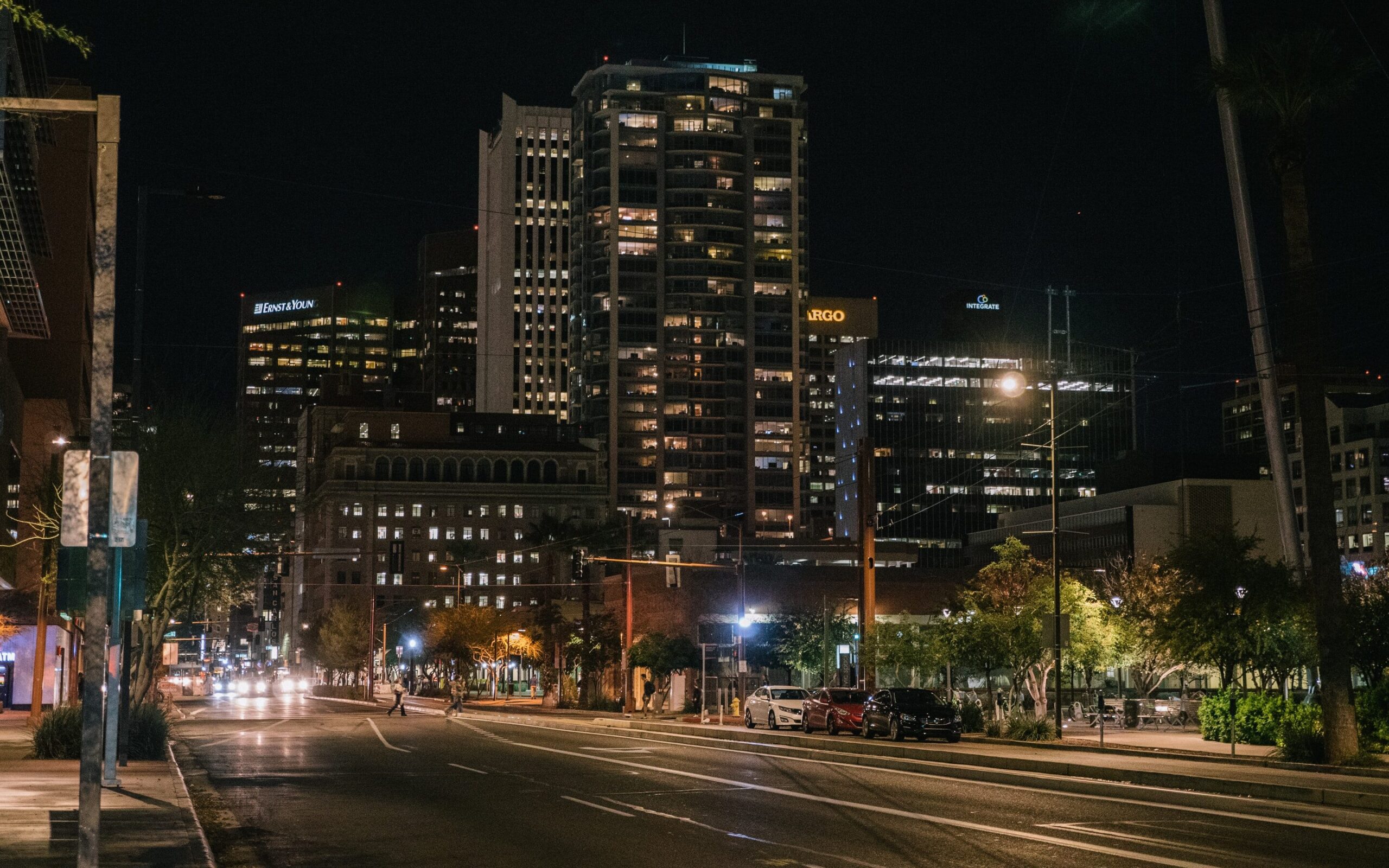Look Out!


Photo by PJ Gal-Szabo on Unsplash
Two armed men wearing tactical gear and masks sit by their cars in a parking lot at night with a street light illuminating their look-out spot. Their look-out spot is not far from a big metal drop-off voting box. This is days ago in Maricopa County, Arizona and the city of Phoenix. It appears the men are armed with guns, and their task, apparently is to watch people drop their ballots into the voting box. Some call it voter intimidation. Others call voter protection – trying to prevent people from acting as mules – that is people packing illegal votes and stuffing the boxes. Some call it fear-mongering and un-American. Others call it ballot security.
And into that little camp of armed and masked men who are wearing tactical gear walks an unidentified Phoenix grandmother who was determined to have a conversation with these men about what they were doing. She who stopped by to drop her ballot in the box, walks right up to the allegedly armed men, says to them, “You don’t mind if I sit here with you?” She sits and a man with a gun stands over her, and she says, “Nice to meet you.” She states her purpose for approaching these men by saying, “I am standing up for everyone’s right to vote without fear of intimidation or retaliation.” Her confrontation ended peacefully and quickly. She later tells a reporter about the experience, “You’d think we live in an autocratic country not the United States of America.”
Tuesday is election day, and as the chair of the board of supervisors of Maricopa County said in an interview – and who is, by the way, a Republican, “We have elections so that we do not have chaos and intimidation and violence. We are losing any sense of logic and reason.” Elections are supposed to lead to debate and conversation and persuasion among the elected legislatures and then legislative action comes next. Instead it seems that elections are becoming a more and more visible sign of division and separation and opposition and rancor and ill-will and even hatred and the demonization of the other to the point of dehumanizing those who are the opposition.
In this context, how do we hear Jesus’ words this morning in what is known as his Sermon on the Plain – as opposed to Matthew’s version of the Sermon on the Mount about which we maybe more familiar? Listen to his sermon: “But I say to you that listen, love your enemies, do good to those who hate you, 28bless those who curse you, from anyone who takes away your coat do not withhold even your shirt. 30Give to everyone who begs from you; and if anyone takes away your goods, do not ask for them again. 31Do to others as you would have them do to you.”
Do to others as you would have them do to you? From our Christian lens is that how we might interpret the Phoenix grandmother’s actions as she approached the men in that dark parking lot? Is that why she sat down not afraid of their guns and said, ‘How are you? Do you mind if I sit with you?” What if we cast our ballots with only those 11 words from Jesus guiding every decision we make? “Do to others as you would have them do to you?” Through your vote treat others as you would want to be treated. Does the person for whom I am voting live by these words from Jesus? (And by way one does not have to be a Christian to live by this simple guideline of fairness and kindness and goodness!)
When we don’t have such a guiding principle we have nothing but division and separation and hatred and enemies, and Jesus ends up having to speak to opposing camps on the plain. Jesus ends up having to speak to opposing camps in our country – like this:Blessed are you who are poor, for yours is the kingdom of God, and in the other camp – woe to you who are rich for you have received your consolation.
21“Blessed are you who are hungry now, for you will be filled and in the other camp – woe to you who are full now for you will be hungry. “Blessed are you who weep now, for you will laugh and in the other camp – woe to you who are laughing now, for you will mourn and weep.22“Blessed are you when people hate you, and when they exclude you, revile you, and defame you on account of the Son of Man and in the other camp – woe to you when all speak well of you, for that is what their ancestors did to the false prophets.”
The rich versus the poor. The well-fed versus the hungry. The happy versus the grieving. The well-respected versus the marginalized. What other divisions in our country do we notice even more as election day approaches? The college-educated versus the high school graduates. Republicans versus democrats. MAGA- Republicans versus established republicans. Moderate democrats versus progressives. Suburban versus city verse rural.
The list goes on and on and as the divisions mount so too does the mistrust, suspicion, fear and yes, even hatred which leads to violence, and in his Sermon on the Plain, Jesus, we read, looks out at the people and who does he see? He sees all people and he is speaking to all people – not just one group or another – one camp or the other, but all people. And he is speaking not just to the chosen group of disciples and apostles – a tiny minority in the huge crowd, rather Jesus looked out and saw women and men, boys and girls, young and old, Jew and Gentile. There were people from all over Judea, Jerusalem, the coast of Tyre and Sidon.
While they were most likely interested in what Jesus had so say, they were much more in need of something much more concrete – and that is healing. Some had various illness and disease. Others were possessed with evil spirits or in today’s language were suffering from mental illnesses and addictions. Some were weighed down by guilt, insecurities and doubt in themselves. Regardless all sought relief, healing, wholeness and a return to a fullness of life in their communities.
Now listen to these verses not included in today’s text (and I ask myself, “Why on earth were these verses excluded?”) Listen: “And Jesus came down with them and stood on a level place…with a great multitude of people…who came to hear him and to be healed of their diseases and whatever held them back…and all the crowd sought to touch him, for power came out from him and he healed them all.” He healed them all!
This is the relief, the hope, the joy Jesus has to offer and in particular to those who are poor, hungry, homeless, grieving, and ill. Jesus seeks out and favors in particular those who are hated or ostracized, those who are seen as different and on the fringes. There is no doubt according to Luke that the ministry of Jesus focuses on those with little but with his touch, with his healing the poor are blessed, the hungry are fed, the sick are healed and the grieving are comforted. Jesus says “with my touch blessed are these my children or perhaps better translations of that churchy word “blessed” are unburdened or satisfied.
But how does that happen now, today, here in our divided society? How does hope and healing and reconciliation become real? How can we do something as basic as vote without intimidating others or fearing for our lives? Jesus gives us the answer when he declares, “Woe to the rich. Woe to those with full bellies. Woe to the happy. Woe to the well-respected.” And a better translation of woe is not something like cursed (like cursed are the rich) or damned are those living the good life. No – rather a better translation is this, “Yikes or watch out or look out!”
Now – Jesus is speaking directly to you and me. “Look out those of you who have plenty. Look out when all that you have gets in the way of lifting up those who have little. Look out for when you are so accustom to eating well you forget to feed hungry people. Look out when you are so used to being well-respected that you neglect loving those who are cast out, hated, marginalized. For we who have plenty can easily confuse things like food and money and possessions and security and respect as blessings from God when in fact such things while nice simply have the potential to kill our souls, to keep us separate, to divide and conquer and to invent enemies.
Remember the courage, the humility and the determination of that Phoenix grandma who boldly dared to reach out – perhaps bless – those who were supposed to be her enemies – those who were supposed to scare her away from voting? “Hi! Nice to meet you! Do you mind if I sit down with you?” On this All Saints Day we can say that she seemed to act like a saint (or at least what we might expect of a saint) towards those sinners, but that would completely miss the mark – completely miss the point.
When she went to them – face to face, eye to eye and sat down with them in their camp, she reminds us that she is no different from them, and they are no different from her…for we are all both saints and sinners at the same time, and we will not be able to see others as the same until we confess at the foot of the cross the truth, and the truth for me is this: “I am a saint. I am a sinner. We are the same.” Try saying the same thing out loud. “I am a saint. I am a sinner. We are the same.” That’s how we create, that’s how we build the beloved community. Amen.

